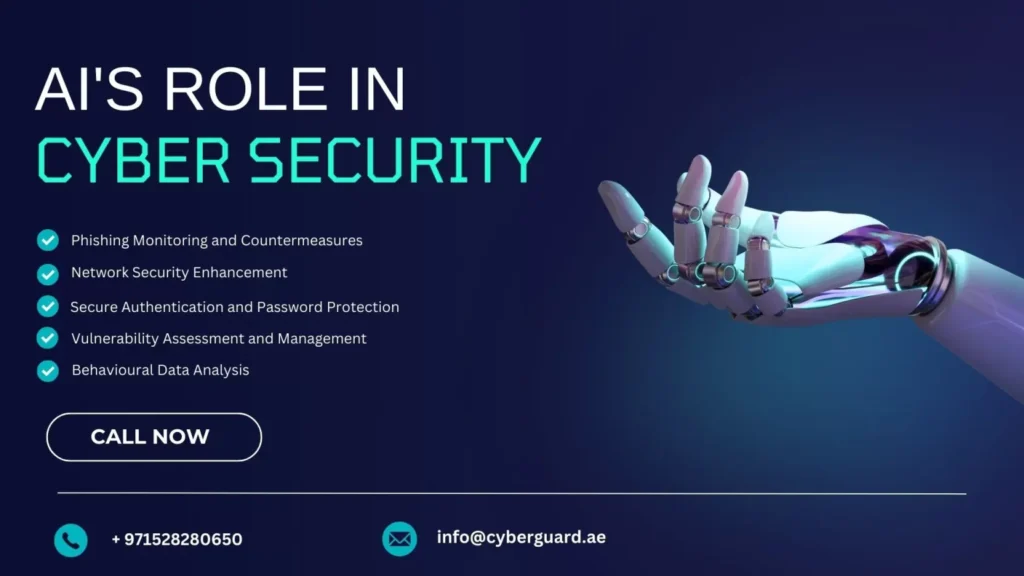AI has penetrated every aspect of human life. As a field closely linked to IT, the influence of AI on the cybersecurity landscape has long been a subject of curiosity. This blog explores the role of AI in cybersecurity.
Why Is Artificial Intelligence (AI) Important in Cybersecurity?
Cybersecurity is the fastest-evolving field in IT. Cybercriminals exploit every new invention in this field. Therefore, it must constantly evolve. AI plays a very important role in many aspects of cybersecurity, such as threat identification, prevention, and response time. AI’s advanced capabilities can effectively be utilized to reveal data patterns that hide anomalies. Let’s look at some of the significant areas where AI can be tapped into to enhance cybersecurity.
High-Level Threat Surveillance
Utilizing AI resources in threat surveillance empowers businesses to detect advanced threats, potential breaches, and covert vulnerabilities in real time and respond quickly.
Behavioural Analytics
AI makes it easier to analyze user behaviors. As a result, any anomalies resulting from vulnerabilities like insider threats can be easily predicted and reinstated in the security posture.
Flexible Security Strategies
AI is quite flexible with the unique security strategies that a business chooses to follow with regard to evolving threats and can easily adjust to defenses and responses.
Minimizing False Positive Rates
AI cybersecurity optimizes threat detection by minimizing false positives. This will mean businesses will not be wasting their resources and spending on unnecessary security strategies.
Dynamic Learning
Another significant area where the role of AI in cybersecurity is tops is the dynamic learning opportunities it offers by way of adapting to new threats and improving detection accuracy over time.
Automated Risk Management
AI automates risk assessment and mitigation. Businesses can train the AI model to identify and prioritize threats based on their risk scale and optimize security.
High-volume Data Examination
AI comes with the capability to process vast amounts of data in real-time and generate useful insights like patterns. This empowers the detection of hidden security threats.
Ongoing Surveillance
By incorporating artificial intelligence into security, businesses can ensure continuous monitoring of their systems and networks. This will enhance their capabilities for real-time threat detection and reduce incident response time.
Why risk your data when AI’s best capabilities can safeguard it ? Consult with us today to discuss how you can leverage AI in cybersecurity for your benefit.
How Does AI Help in Cybersecurity?
Having seen the significance of AI in cybersecurity, let’s see how it can benefit businesses or organizations that rely on it.

Quick Identification of Phishing
AI and cybersecurity go hand in hand in detecting phishing attempts. By integrating the capabilities of both, businesses can identify and block malicious phishing emails before they reach employees or other stakeholders.
Greater Precision and Efficiency:
Generative AI cybersecurity practices can significantly improve the precision and efficiency of security processes by reducing dependence on manual effort and maximizing accuracy in threat identification and response.
Ongoing Adaptation:
By continuously learning from evolving threats, AI updates its databases to recognize threats, improve defences, and thereby ensure proactive protection against any new attacks that can surface.
Improved Threat Detection:
Combining cybersecurity and AI, businesses can significantly improve their detection capabilities to identify advanced-level threats like zero-day attacks, that too in real-time, and implement quick responses.
Minimal to Zero Human Errors:
One of the most attractive sides of AI in Cybersecurity is its automation capabilities which reduce human intervention and human-made errors. AI can take over most of the routine security tasks
Predictive Data Insights:
AI can comprehensively analyse all your security data and forecast any potential threats based on the insights it makes from them. These actionable insights can empower you to implement proactive risk management
How Does AI Work In Cybersecurity?
Once you engage an AI security company to enhance your cybersecurity posture, the following steps take place.
Data Collection:
At first, the AI tools will be used to collect security data from every source, including your networks, logs, and endpoints, for a comprehensive analysis.
Data Analysis:
AI’s advanced capabilities are then used to analyse the large chunk of data to identify patterns and detect any loopholes leading to potential security threats.
Threat Detection:
AI will now be triggered to use its up-to-date algorithm to detect all known and unknown threats and vulnerabilities, including phishing and malware.
Attack Forecasting:
Once it has learned about your security posture and the anomalies, AI will forecast the likelihood of future threats.
System Adaptation:
At this stage, all your systems, networks, and applications will be made compatible to deal with evolving threats by updating defences and responses.
Process Automation:
AI in cybersecurity will now automate all your security processes, equipping you with improved incident response and minimizing your manual effort.
Incidence Response:
At the final stage, AI will respond to confirmed threat cases in an isolated manner, minimizing damage and downtime.
What Is Responsible AI In Cyber Security?
The increasing adoption of AI in cybersecurity has led to reports of misuse. This has highlighted the importance of responsible AI in cybersecurity. Responsible AI in this context refers to the responsible, transparent, and ethical use of AI capabilities for threat detection and prevention.
Applications of AI in Cybersecurity

Phishing Monitoring and Countermeasures:
Phishing detection and prevention is one of the top AI in cybersecurity
Network Security Enhancement:
AI-powered systems are highly immune to threats emerging from networks. For instance, these systems can stop unauthorized access attempts.
Secure Authentication and Password Protection:
When AI capabilities are used in user authentication, it can significantly reduce password attacks.
Vulnerability Assessment and Management:
AI in cybersecurity can be trained to identify vulnerabilities and prioritize remediation actions.
Behavioural Data Analysis:
With AI’s capabilities, it is possible to examine user behaviour ,quickly detect suspicious activities and effectively rule out insider threats.
Conclusion
Artificial intelligence is a reality now. Integrating AI into cybersecurity is essential in today’s world. It can not only streamline your cybersecurity efforts but also improve accuracy, speed, and efficiency. This blog aims to provide a broader perspective and help you make informed decisions about AI integration into your digital security strategy. For any professional assistance or guidance regarding this topic, contact Cyber Guard, a leader among cybersecurity companies.
Frequently Asked Questions
Artificial Intelligence (AI) in cybersecurity is the process of employing machine learning capabilities and potential in cyber threat detection, attack prediction and automation of incident response.
AI is integrated into cybersecurity through machine learning algorithms. These algorithms heavily rely on natural language processing and predictive analytics tools for their datasets.
AI is definitely a help for cybersecurity as it can enhance various aspects, such as vulnerability assessment, threat detection, incident response, and security data analytics, among others. However, it is also important to note that AI can be misused and may pose threats. Proper education through AI in cybersecurity courses and associations with reputable security service providers can help minimize these risks.
Yes, automation in cybersecurity is safe as long as it is combined with proper human monitoring. By leveraging automation, it is possible to improve the accuracy of security measures and prevent advanced attacks or human-made errors.


